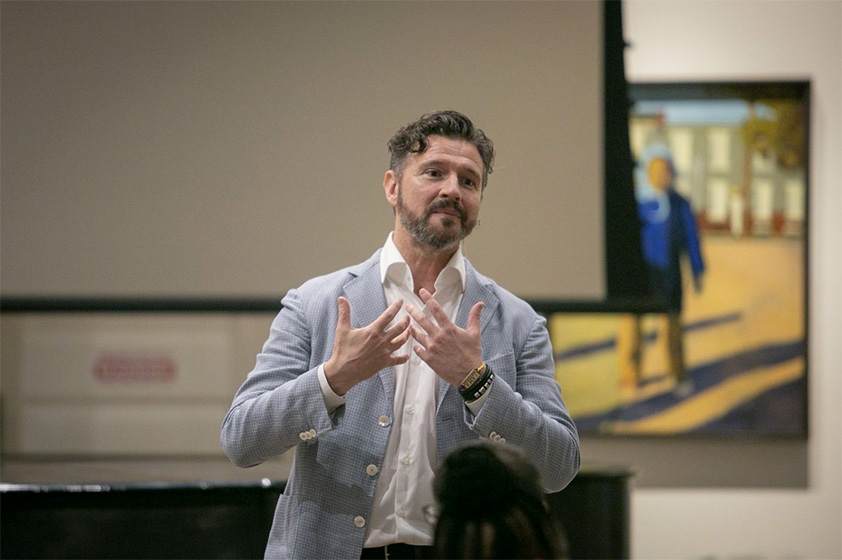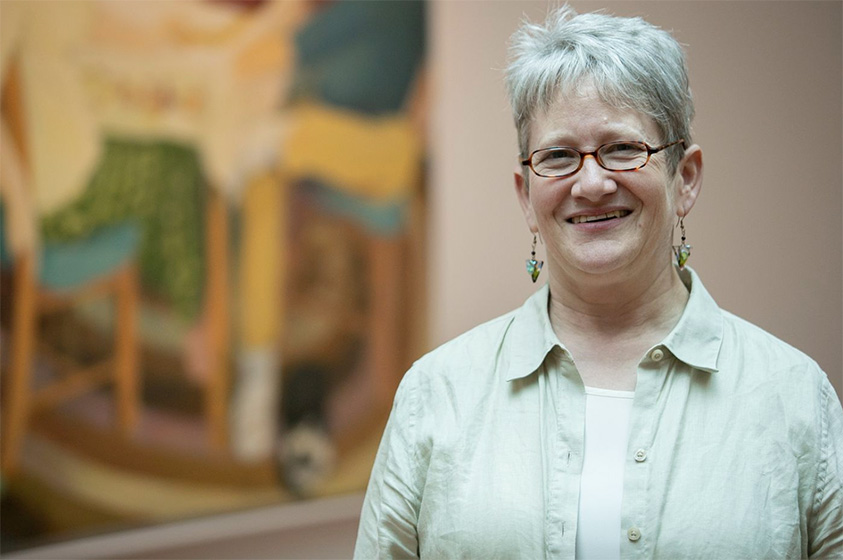Alzheimer’s patients often feel lonely. Here are ways to help them.
This article is a repost from Stacey Burling of The Philadelphia Inquirer’s coverage of this month’s “Love is Listening” Workshop at Woodmere Art Museum

Doctors and scientists have devoted mountains of effort to finding treatments for the scourge of aging: dementia. So far, they haven’t come up with much.
Michael Verde, who comes to this issue from a more philosophical perspective, thinks that, in the absence of a cure, we would all do well to focus much more energy on what causes the most suffering in people with dementia. Dying brain cells don’t cause pain, he said. What really hurts, what threatens the very core of what it means to be human, is the way that people with dementia become cut off from their communities and loved ones.
“They lose their feeling of belonging and mattering in a social body,” Verde told a crowd of about 70 professional and family caregivers at Woodmere Art Museum in Chestnut Hill a few days ago. Verde, who founded and runs an Indiana-based organization called Memory Bridge, was in town for several presentations sponsored by ARTZ Philadelphia, a nonprofit that provides artistic experiences for people with dementia and their caregivers. Memory Bridge, Verde said, is an organization “dedicated to ending the emotional isolation of people with dementia.”
Susan Shifrin, who founded ARTZ, took a multiday workshop with Verde in 2016 and wanted to share him with people in Philadelphia. Without effective treatment, she said, “humanist intervention is what we’ve got right now.” The program helped her become a better listener for clients with dementia and that, in turn, has helped them open up.

Verde, a Texas native who speaks with the cadence of a Southern preacher, said people with dementia are capable of making surprising connections if approached with empathy. Although caregivers are often taught about techniques and strategies to improve behaviors associated with dementia, Verde argued that improving the emotional quality of relationships can naturally lead to improved behavior, or at least better understanding of why people with damaged brains struggle to fit in a world that feels increasingly cold and confusing.
Verde said that research has shown that we make judgments about whether to categorize others as “us” or “them” within a split second of meeting. Too often, he said, a dementia diagnosis instantly shifts people into the “them” category, beginning the process that can strip them of key relationships and lead to debilitating loneliness.
Imagine, he said, the case of William, a man whose neighbor has just learned he has dementia. Even though William has not changed since the last time she saw him, the neighbor will now treat him differently. Perhaps she will study him, looking for signs of his decline.
“Between Monday and Tuesday, something profound has happened in William’s life,” Verde said. The change will not show up in any medical tests. “William is now in a different category of humanness.” He will sense that something about his neighbor has changed, that the self she is reflecting back to him is different and worse, that he no longer belongs the way he once did. “Our being is a creation of relationship,” he said.
Even efforts to raise awareness about Alzheimer’s and other forms of dementia can make isolation worse, Verde said, because the emphasis on how devastating brain damage can be increases the sense that those with dementia are not us.
“Helping them is not the same thing as loving us,” he said. “We are craving a kind of intimacy that friendly and nice and tolerant probably doesn’t capture.”
Those of us who are cognitively healthy can rise above our snap decisions about people with dementia by thinking about why we might recoil — Are we, for instance, afraid that this might be our own fate someday? — and by opening ourselves to their deeply human need for connection, Verde said. “You don’t have to know the day of the week to feel that someone respects you,” he said.
“You don’t have to be able to count backward from 100 by sevens to feel that your life has consequence to other lives.”
He urged the audience to let go of judgment, particularly of themselves, when interacting with people with dementia and to focus on what is happening in the present. Let it be. Accept the new normal.
Jenny French, of Flourtown, came to the Woodmere workshop because she was struggling with how to help her 92-year-old mother, who has dementia but is still living independently. Her mother does not realize how much ability she has lost, French told Verde, and needs help with her finances. “How do I honor her and yet protect her?”
First, Verde said, don’t think of this as a math problem with a solution. “We’re not talking about something that you’re going to fix or solve,” he said.
Being able to handle her bills may have made her mother feel competent and part of the larger community, he said. It will be important for her mother to “feel secure that her belonging is not related to her perfection.”
Later, French said she’d found Verde’s presentation helpful. She’d been thinking about how frightening it must be for her mother to be losing control over parts of her life. She vowed to “treat her like the mother she’s been, a whole person, and not someone with this disease that I somehow need to control.”
Originally published by Stacey Burling of The Philadelphia Inquirer– read the original article here.
Also please visit our Love is Listening page here to learn more about the events that took place!

Stacey Burling | @StaceyABurling | sburling@inquirer.com
